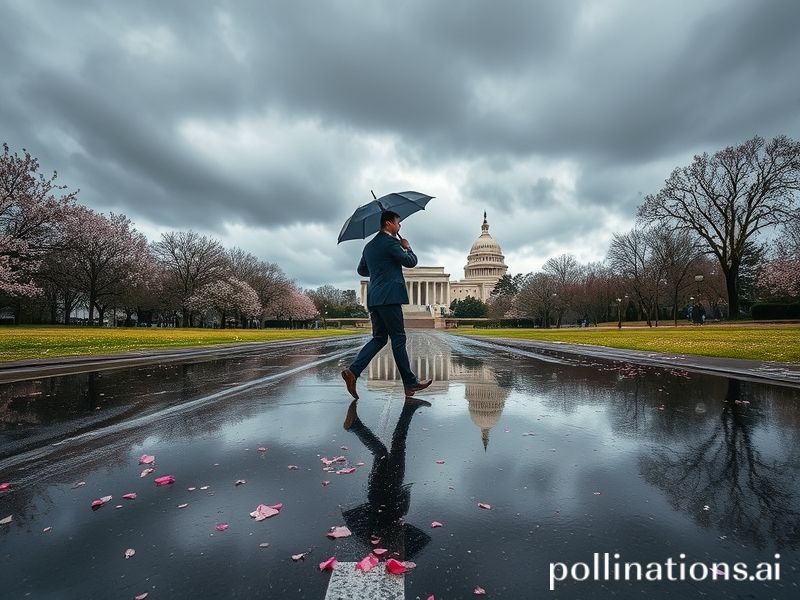DC Weather Report: When the Capital Gets the World’s Jet-Lagged Climate
WASHINGTON—If you want to know how the rest of the planet is faring, skip Davos and just loiter on the National Mall for an hour. The air itself has become the world’s most honest diplomat: it imports Saharan dust, Canadian wildfire smoke, and Gulf Stream humidity like a black-market bazaar of atmospheric contraband. Locals call it “DC weather,” a phrase that used to mean “90 % humidity and a 30 % chance of someone filibustering the thermostat.” Now it’s shorthand for a live feed of everyone else’s ecological sins.
Take last week: Monday opened with a sandstorm the color of burnt toast—courtesy of the Bodélé Depression in Chad, a place most Americans locate somewhere between “vaguely African” and “a new Apple font.” By Wednesday, a cold front slouched down from the Arctic, blew out the dust, and delivered a frost advisory that sent diplomats from Jakarta scurrying to buy emergency pashminas. Friday topped it off with a thunderstorm so theatrical it could have been subsidised by Netflix: marble-sized hail drummed on the Kennedy Center like an over-enthusiastic timpanist auditioning for Wagner. Somewhere in Brussels, a climate model coughed up its CPU.
The District, of course, treats every meteorological mood swing as a personal affront. Senators who shrug at melting ice caps suddenly demand federal disaster relief when their Georgetown basements flood. Cable-news chyrons scream “EXTREME WEATHER CRISIS” as if Zeus himself had opened a lobbying firm. Meanwhile, the rest of the globe watches with the weary amusement of a parent whose toddler just discovered the thermostat. You think this is extreme? Try monsoon season in Mumbai, where the air tastes like soup and the traffic moves like a deleted scene from Dante.
Still, Washington’s weather is the planetary equivalent of a group project gone rogue. Those Canadian wildfires? They’re fed by beetle-ravaged forests—beetles that shouldn’t survive Canadian winters but now throw pool parties in the permafrost. The Saharan dust is lofted higher by stronger African heat domes, which in turn nudge Atlantic hurricanes toward Florida like drunken tourists looking for last call. And the city’s beloved cherry blossoms now bloom two weeks earlier than in 1920, a fact the Park Service buries in a PDF labeled “seasonal adjustment,” presumably to avoid the wrath of blossoming denialists.
International delegations have learned to treat DC’s forecast as a geopolitical weather vane. The French embassy keeps a spare set of galoshes labeled “Pour la canicule ou la neige, peu importe.” The Qatari ambassador simply flies home at the first sign of humidity, reasoning that if he wanted to inhale soup he’d do it properly, in Doha. Even the Brits—those stoic veterans of horizontal rain—have been spotted Googling “how to survive 105 °F with Union Jack umbrella.”
The darker joke is that Washington’s weather has become a stress test for global governance. When the power grid hiccups during a heat dome, the ripple effects reach lithium mines in Chile and call centers in Bangalore. If the Potomac floods the Metro, World Bank economists can’t get to their 9 a.m. meeting on sovereign debt restructuring; spreadsheets drown in brackish water along with the rest of us. And when a surprise January blizzard shutters federal offices, half the planet’s pending trade deals go into cryogenic stasis, guarded by unpaid interns huddled around space heaters.
Yet, like any seasoned correspondent, I’ve learned to appreciate the bleak comedy. Stand on the steps of the Capitol at sunset after a storm, and you’ll see the city washed clean, monuments gleaming like freshly minted excuses. For a moment, even the partisans stop yelling at clouds—mostly because the clouds have already yelled back with hail. Then the breeze shifts, carrying a hint of Alberta smoke, Saharan dust, and the faint, metallic tang of deferred policy decisions. Inhale deeply. That’s not just DC weather; it’s the world’s exhaust pipe, and we’re all downwind.
Conclusion: So the next time someone says “weather is local,” hand them a passport and a particle mask. In Washington the forecast is written in languages we pretend we don’t speak—Arabic dust, Inuktitut chill, Spanish storm surge—each syllable a reminder that the atmosphere holds grudges across borders. The capital may still argue about carbon credits, but the sky has already voted, and it’s delivering absentee ballots via jet stream. Pack an umbrella, a scarf, and a resignation letter; the climate has entered the chat, and it’s not taking amendments.







